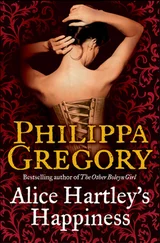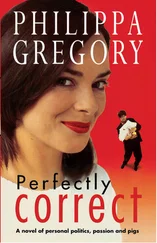We turned left, past the church, and rode down the lane. I half expected, half feared some sign of the villagers and I faced that thought not with courage but with dull numbness. What more could they do? They had ceased to love me; they had learned to hate me. They dared do nothing against me other than hidden threats and childish cruelty. I might ride down Acre street every day of my life. If they did one thing to displease me I had the power to raze the whole village. I could burn the roofs over their heads. And they knew it.
As Tobermory walked down the street a woman in one of the gardens looked up from the pitifully short row of vegetables she was weeding. She took in the handsome hunter and my smart grey habit in one swift glance, and then she gathered up her child and swept indoors. Her cottage door banged, like a shout. And I could hear the sound of the bolt being shot. As if to distract me from her rudeness — although I knew her name, Betty Miles — a barrage of bangs followed me down the village street. They had seen me from the little windows of their unlit cottages. They had heard Tobermory’s hoofs as they sat beside their empty fireplaces with little in the stew pot and no wage coming in, and then they had gone to their front doors and banged-them sharply two, three times. Acre was shut against me, as the land was closed to me.
I rode Tobermory home, and stopped only briefly to look at the great wheatfield where the common land had once been. As if by some spell you could see the old landmarks under the blanket of the pale green wheat crop. The two valleys showed as indistinct lines. Even the great hollow, where the oak tree’s roots had spread, showed as a dip. And the two footpaths that led from where I sat on my horse showed as two little trenches leading from the oak tree’s gap up to the hills where the heather was budding and the ferns showed green. In my clear tired mind I knew that the infilling had been done badly because I had not been on the land to check it; that another year’s ploughing would wipe out all traces that the land had been open and loved and free to all the village.
But sitting on my high hunter with my pretty cap perched on my head, it seemed to me that I might plough and plant this field every season for a thousand years and you would still be able to see where the village children had driven the geese, and where the oak tree had stood for courting couples to carve, announcing their betrothal.
I turned Tobermory with heavy hands and headed for home at a jolting trot. It was a warm scented humming summer afternoon. The silk of my dress was rippling in the breeze of the trot that lengthened into a canter as I dropped my hands and Tobermory lengthened his stride. I moved in the saddle like a lump of wood, and under my ribs felt like a frozen stone.
* * *
Only Harry welcomed me back with blind good humour. They were taking tea in the parlour when I came in, unpinning my cap for it seemed suddenly too tight.
‘Good to see you out on the land again!’ he exclaimed, his voice muffled around some fruit bread.
Celia’s eyes were on my face, worried at my pallor. I saw her glance at John and he scanned me with his measuring, professional, unloving stare.
‘Have a cup of tea,’ Celia said, gesturing to John to pull the bell pull. ‘You look tired. I’ll order another cup.’
‘I am perfectly well,’ I said with some impatience. ‘But you were quite right, Celia, it does look like being an excellent crop. With a good summer we should clear many of the outstanding debts of the estate.’
I shot a look from under my eyelashes at John as I said this. He looked scornful, and I was certain, as I had guessed, that the MacAndrew fortune had bought even lawyers’ and merchants’ secrets, and that John alone of the three of them knew that one season would not clear our debts. Four or five good ones would be needed. And whoever had good weather when your survival depended on it? I was running on the spot with Wideacre, like one of those dreadful dreams when you cannot flee from a threat coming for you.
‘Excellent!’ said Harry heartily. ‘I am especially glad that you are up and about, Beatrice, because I wanted you to take the London corn merchant to the fields next week.’
I frowned at Harry, but the damage was done.
‘A London corn merchant?’ asked John quickly. ‘What can he want here? I thought you never sold direct to the merchants?’
‘We don’t,’ I said promptly. ‘We never have done. But this man, a Mr Gilby, wrote to say that he was in the area and would like to look at our fields to give him some idea of the standard of Sussex wheat.’
Harry opened his mouth at the lie, but at a look from me closed it again. But that single betraying gesture was enough for John, who looked hard at Celia in an unspoken message that as good as called me a liar to my face.
‘Perhaps it would be better if you did not see him, Harry,’ Celia said, her soft voice tentative. ‘If he were to offer a very good price you could not help but be tempted, and you know you have always said that local corn should be locally sold and locally ground.’
‘I know,’ said Harry impatiently. ‘But one has to move with the times, my dear. Wideacre is farming in the way that all sensible land is now run. And the old idea of little markets and a pennyworth of corn for the poor is really not good business sense.’
‘And hardly a conversation for the parlour,’ I suggested smoothly. ‘Celia, could I have another cup? This warm weather makes me so thirsty. And do you have some sugar biscuits there?’
Celia bustled behind the urn, but I could tell by her face she had not finished. John stood still by the fireplace, his eyes on Harry, and then looking in turn at me. He looked at us both with a detached curiosity as if we were some specimens in his university medical training that were interesting, but rather unpleasant, examples of some lower animal life.
‘So you will not sell to him,’ he said flatly. He knew very well we had to. I had to sell to the top bidder to start to clear the backlog of debts.
‘No,’ I said firmly. ‘Or at the very most we will sell only a small part of the crop. The wheat off the new fields, which would not have been in the market last year anyway. There can be no objection to that. It would be madness to flood the Midhurst market with corn and bring the price down, after all.’
‘Indeed?’ said John, with affected interest. ‘I should have thought that after the winter the poor have endured you would be glad that they should have cheap bread this summer and autumn.’
‘Oh, yes!’ said Celia with emphasis. ‘Do say that it will be a good harvest and the benefits will be passed on to the poor, Harry! Beatrice! It has been a terrible winter for them, as John says. But one good summer and I am sure all of Acre would be happy and well fed again.’
I sipped my fresh cup of tea and said nothing. She was Harry’s wife and he had sworn he would have no ill-informed sentimental meddling with our land. He shuffled his feet and looked back at me to give him a lead. Like a cat’s green unwinking stare, my eyes were on his face, challenging him to make a stand against Celia’s mistimed Christian spirit.
‘I won’t discuss it,’ Harry said at length. ‘Celia, you and John are very right to care for the poor; I care for them myself. No one wants anyone to go hungry. But if they are so improvident as to marry and have huge families without knowing how they are to support themselves they can hardly expect cheap wheat. Of course there will be no starvation in Acre. But I cannot support a whole village as well as run the estate as it should be run.’
‘Should be run?’ John queried.
‘Oh! Let’s change the subject!’ I said with abrupt playfulness. ‘Harry the Squire has spoken! And indeed there is little hardship in Acre now the good weather is coming. Let us talk instead about some visitors or amusements now summer is here. I long to take Richard down to see the sea; shall we make a party of it?’
Читать дальше
Конец ознакомительного отрывка
Купить книгу












